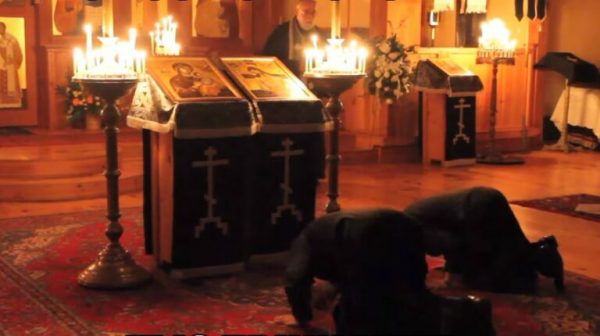It has now been a year since the COVID-19 pandemic emerged, changing almost overnight nearly every aspect of our day-to-day lives in the modern world. Some of us have lost loved ones; the Church has bidden farewell to more than a few holy men and women whom the Lord chose this year to call home. The quarantine restrictions that have been in place more or less continuously throughout the world have also parted those of us still among the living from one another, to an extent most of us never even dreamed was possible. Many have lost their livelihoods, and face the real possibility that they may never get them back. But by no means the least among the tragedies brought about by this pandemic has been the loss suffered by many people of normal Church life: regular corporate prayer and worship, and regular reception of the Holy Mysteries of Christ.
Yet we know that absolutely nothing in this world happens that is not in accordance with the providence of our loving and all-merciful God. Though God does not send us temptations, as the Apostle says: “Let no man say when he is tempted, I am tempted of God” (James 1:13), nevertheless the temptations which He does allow to befall us are allowed precisely because through them we have the opportunity to find our salvation. And though without question the COVID-19 pandemic has brought immense tragedy, at the same time it has also brought the most precious gift which this vain and fleeting life can possibly offer: the opportunity for repentance.
How many of us took the Church services – and even the Holy Mysteries of Christ – for granted, squandering countless opportunities to come and pray during the Divine Services, to confess our sins, and to receive the Holy Eucharist? How many of us took for granted the people whom God placed in our lives (perhaps preferring to commune instead with the countless screens which are now with us everywhere we go), and whom we now wish we once again had the opportunity to see and speak with, face to face? How many of us were lulled into complacency by the subtle yet ever-present lie that this life will go on forever, that the treasures we gather will never be taken from us, that the world we spend so much time building up will never fade away? But for those with eyes to see, the pandemic has exposed this lie once and for all: everything earthly is fleeting, and every human life leads inexorably to the grave.
But for the true Christian, such a revelation is not at all a cause for despair: on the contrary, it is a great and holy opportunity to turn our eyes instead toward Christ, toward the Kingdom of Heaven, toward the resurrection from the dead, and toward the eternal life and the unending and unspeakable good things which God promises to give to all those who ask. And all these promises are both found and fulfilled in precisely one thing, and one thing only: a holy life, a life offered freely from a heart given entirely unto Christ our God.
It is to just such a life that Great Lent summons us. It is to just such a life that the current pandemic summons us. We see all around us the futility of putting our hope in earthly happiness, of placing our trust in things fickle and fleeting. Let us instead take the opportunity of this great and holy fast to accept the summons of the Divine Liturgy, to imitate the holy angels and “lay aside all earthly care, that we may receive the King of All.” And just as we penitentially fast from the joy of the Divine Liturgy during the weekdays of Great Lent, let us accept any absence from the Divine Services which circumstances have forced upon us as a penance for our sins, which is to say an opportunity for us to repent more fully and to pray more deeply, so that when God calls us once again to meet Him in the Divine Liturgy we will do so with purer hearts and humbler spirits – and then will our joy truly be made full.
The Holy Fathers tell us that there are many times when we might wish to exercise various virtues, but circumstances prevent us: we might wish to give alms but have no money, or to visit the sick but have no time, and so on. In the midst of this pandemic we doubtless do not need to think very hard to come up with examples of this from our own lives. But the Holy Fathers say there is one virtuous deed that no circumstance whatsoever has the power to prevent us from accomplishing: and that is prayer. Wherever we are and whatever our life is like, up until the moment of our last breath we always have the opportunity to offer up prayer to the Lord God – both for ourselves and for the sake of others. And as we ourselves draw closer to God through prayer, so too we will mystically draw closer to one another in Christ, according to the witness of the saints. Such union in Christ is the only possible solution to the loneliness and isolation so many of us now feel.
And so during this Great Lent, in a time of so much inconstancy and uncertainty, let us resolve to make prayer the sure and certain foundation of our lives. Let us fast especially from anger and judgment, which have the power to drive away prayer as nothing else can. And let us give what alms we can, including in the form of increased prayer for the souls of those who have departed this life (especially during the past year of this pandemic) and are no longer able to offer up repentance on their own behalf.
In the midst of this season of sickness and death, of suffering and hardships of so many kinds, the world is in more need than ever of the witness of faithful Christians to the hope and joy of the Resurrection of Christ. As Orthodox Christians, we have been given so much: and now, according to the word of the Lord, much is therefore being required. So let us strive with all our hearts to make a new beginning this Great Lent in prayer and repentance, so that our hearts will become vessels of the Holy Spirit and thus able to shine as beacons of grace and truth to all we meet, drawing all men and women to shout alongside us on Pascha night: “Christ is Risen! Truly, He is Risen!”

















